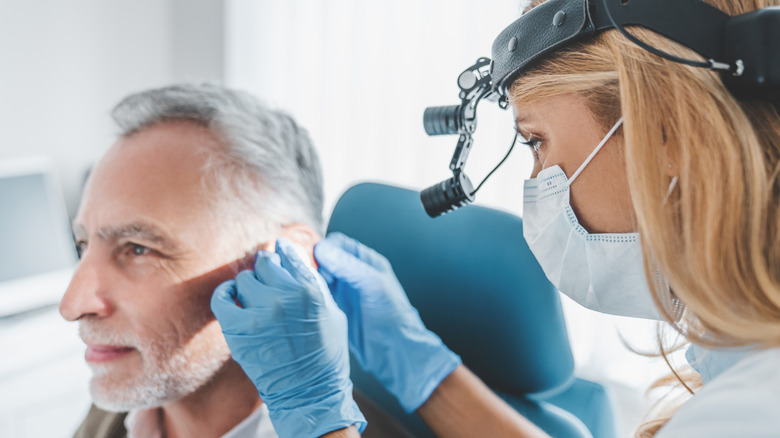This Eye Color Increases Your Risk Of Hearing Loss
Having one of the rarest eye colors can undeniably make you stand out. However, it might also lead to your having hearing problems down the road. (Read what happens if hearing loss goes untreated.) Though the link between auditory problems and eye color may sound bizarre, it's been documented and explored. And you'll want to pay attention if you have green eyes, which just 2% of the population does, according to the American Academy of Ophthalmology (AAO).
Case in point: A 2014 review that was published in Otolaryngology Head and Neck Surgery looked at the findings from a series of studies, including one study involving people who had head and neck tumors and had developed radiation-induced ear diseases. Those with green eyes lost more of their hearing than their blue- or brown-eyed peers.
But what is it about the pigmentation of your iris that could make you more susceptible to auditory problems? Or for other issues related to eye color, for that matter? The answer may lie in the presence of a substance that determines what color an individual's eyes will be.
The effects of natural pigmentation on the eyes and ears
The AAO explains that brown is the most prevalent eye color. The brown shade comes from an abundance of melanin, a pigment that offers protective capabilities, including helping to reduce damage from harmful direct sun exposure. (Read how melanin really benefits your skin). But melanin doesn't just make itself known in the eyes and skin; it also offers assistance within the folds and structures of the inner ear.
As noted in a 2007 comparison study in JAMA Otolaryngology Head and Neck Surgery, inner ear melanin is presumed to protect against different types of hearing loss, such as loss associated with trauma, noise, and drugs. In mice, having sufficient melanin levels seemed to be related to less age-related cochlear inner ear damage. The more melanin, the better, which is why people with light eyes may be at a disadvantage from a hearing perspective.
This doesn't mean that people with green eyes are destined to lose their hearing. However, green eyes don't contain much melanin. Consequently, those with green eyes may have higher risk factors.
Solutions to reduce the risk of hearing loss
If you were born with green eyes, you can take actions to reduce your chances of being diagnosed with preventable hearing loss. For instance, the U.S. Centers for Disease Control and Prevention recommends wearing ear protection like earplugs or earmuffs in loud settings to lower the likelihood that you'll experience noise damage.
What if you're taking a prescription drug that's known to cause problems with hearing (often referred to as an ototoxic medication)? A 2022 article in the Bulletin of the World Health Organization recommends asking about alternative therapies to minimize irreversible hearing loss from common ototoxic treatments. As explained by the American Speech-Language-Hearing Association, 200+ medications are known to be ototoxic to everyone, not just people with a specific eye color. By working with your doctor (and potentially an audiologist) while taking them, you may be able to limit their side effects, like ringing in the ears (tinnitus) and difficulty with balance.


